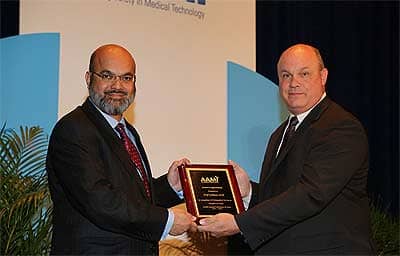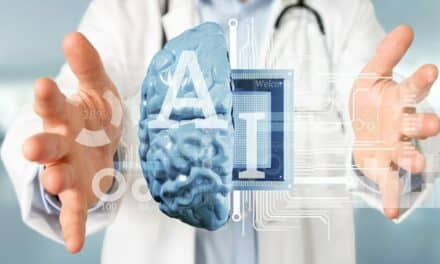AAMI and BSI (the U.K. national standards body and international standards developing organization) have teamed up to explore the ways that artificial intelligence (AI) and machine learning pose unique challenges to the standards and regulations that govern medical devices and related technologies.
The resulting new position paper, Machine Learning AI in Medical Devices: Adapting Regulatory Frameworks and Standards to Ensure Safety and Performance, is available for free download. The position paper examines how machine learning is different from traditional medical devices and medical software.
“Machine learning products and applications have aided clinical practice and contributed to more accessible, efficient, and effective healthcare. However, as machine learning amplifies AI capabilities, numerous concerns arise,” says Joe Lewelling, senior standards advisor at AAMI. “This position paper, developed in collaboration with more than 30 AI and machine learning experts in the U.S. and the U.K., provides recommendations for additional guidance or standards that might be needed to promote the safety and efficacy of medical technologies.”
AI mimics intelligent human behavior, processing, and analyzing data at a scale impossible for humans to do on their own. Some AI technologies make diagnoses or deliver therapy, using static, rules-based systems and established clinical protocols. Machine learning takes AI a leap further, continuously learning, making predictions and judgments, and, in some systems, modifying algorithms autonomously.
“This group shared very pragmatic, boots-on-the-ground challenges,” says Pat Baird, senior regulatory specialist and head of global software standards at Philips, who co-authored the position paper. “Data quality and applicability are very essential—the old ‘garbage-in, garbage-out’ rule—so data quality will be a key success factor.”
The following recommendations are made in Machine Learning AI in Medical Devices:
- Developing, in collaboration with International Medical Device Regulators Forum (IMDRF) and other regulatory bodies, standardized critical terminology and a taxonomy for medical AI that can inform future national and regional regulatory approaches to the technology.
- That IMDRF establish an AI working group to address issues around AI in healthcare and to prepare needed guidance and good regulatory practices.
- Mapping AI-applicable international regulatory standards (where such exist) to the October 2018 IMDRF Essential Principles and identifying gaps where additional new standards or guidance are needed.
- Developing guidance on factors affecting data quality regarding AI as a medical technology.
- Establishing a common set of criteria for the deployment of AI in healthcare systems that could be used as an evaluation protocol by multiple stakeholders, covering organizational management, professional conduct, research and ethics, evidence-based practice, and data governance.
- Developing risk management guidance to assist in applying ISO 14971 to AI as a medical technology.
- Developing guidance on factors to consider in the validation of AI systems and on the use of non-traditional approaches, such as excellence assessments, to demonstrate a reasonable assurance of product quality.
Visit the AAMI Store for a free download of Machine Learning AI in Medical Devices.




